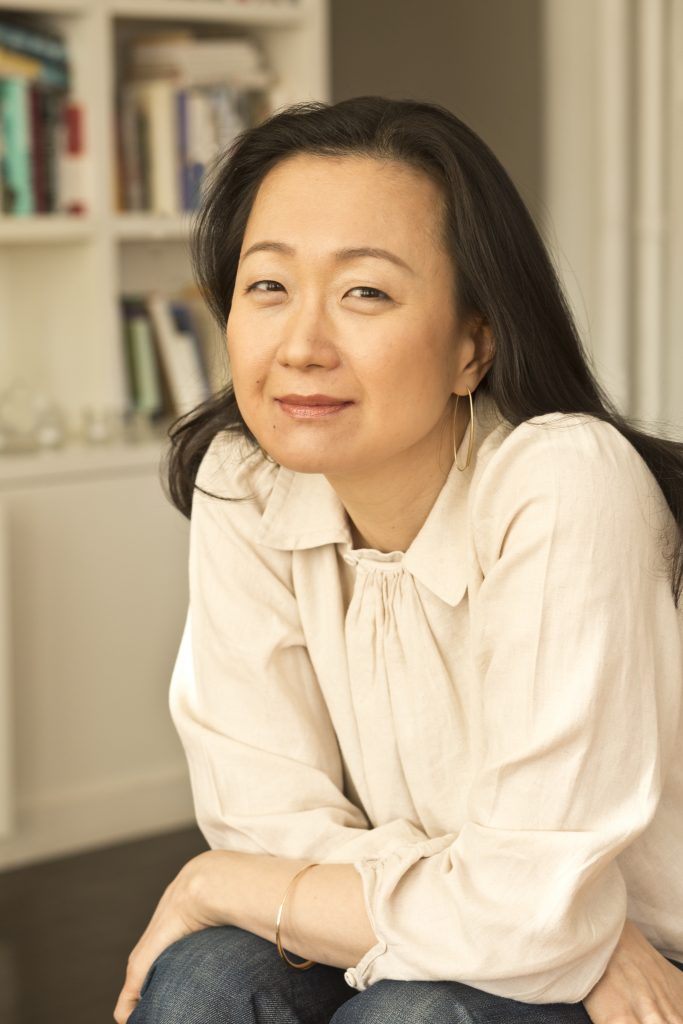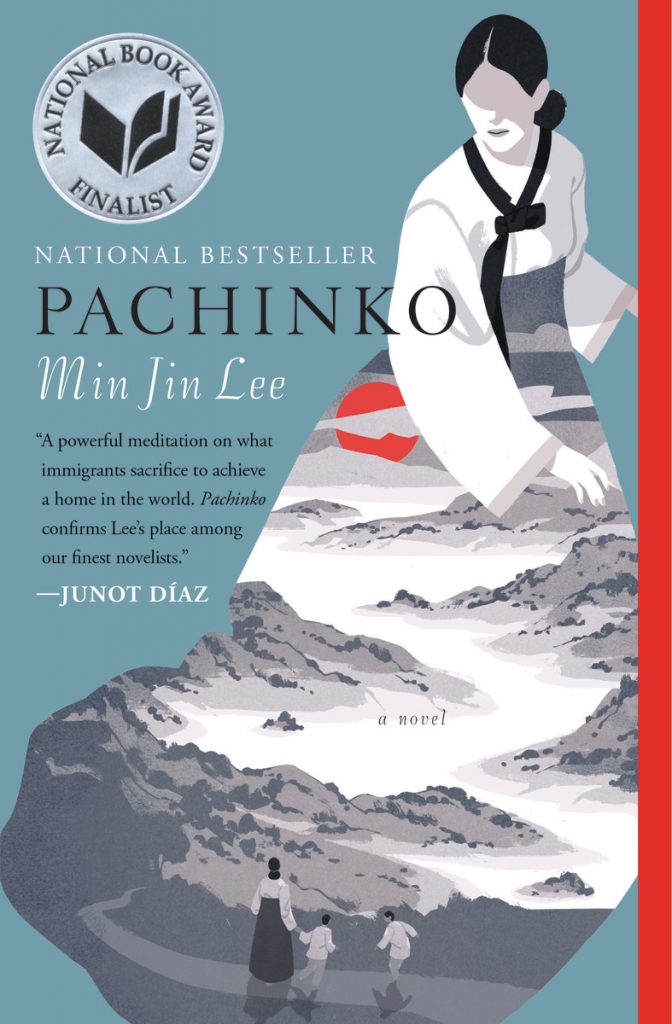
By Janis Fontaine
Min Jin Lee has earned her place among today’s outstanding writers with the publication of Pachinko, an epic tear-jerker that follows a poor, hard-working Korean family for most of the last century, beginning in 1910. The book topped dozens of best books lists for 2017, including The New York Times, and was nominated for a National Book Award.
Lee’s characters are the people most of us would pass on the street without even noticing, and yet they embody the passion, strength, determination and integrity of the human race in a way that makes you proud to be a member. It’s almost an illustration of the words of legendary UCLA basketball coach John Wooden: “The true test of a man’s character is what he does when no one is watching.” It’s what these proud people do in their almost invisible lives — how they nurse the sick and treat the poor (because poor as they are, there are still families who have less) — that redeems us as a people.
An NPR book reviewer called Lee’s work “honest writing, fiction that looks squarely at what it is, both terrible and wonderful.” Maybe that’s why this book stays with you, echoing around in your psyche, tickling your moral compass, and maybe making you rethink your own life and motivation.
Lee was born in Seoul, South Korea, in 1968. She came to the U.S. in 1976, and her family settled in Elmhurst, Queens, where her parents owned a wholesale jewelry store. She grew up without much money, but hard work landed her in the Ivy League. She majored in history at Yale, then went to law school at Georgetown. Lee worked as a corporate lawyer for a few years, until a chronic illness forced her to quit. She’d always loved storytelling and writing, but couldn’t afford to pursue another degree, so she developed her own creative writing curriculum, attending lectures and workshops whenever she could.
From 2007 to 2011, Lee lived in Japan, where she did hundreds of interviews with the local people, immersing herself in Asian people and culture, and writing.
Pachinko isn’t Lee’s first home run. A decade ago, her debut novel, Free Food for Millionaires, was named one of the top novels of year by The Times (London), NPR’s Fresh Air, and USA Today. The story of a Korean-American protagonist unsure of her cultural place in the world, Free Food for Millionaires took a hard look a wealth and privilege and the haves and have-nots, but also redefined a new intrinsic, personal wealth that trumps economic status.
Pachinko is Sunja’s story. It begins in 1910, in Korea, years before there was a South and a North. She’s a poor but happy child, the beloved daughter of a disabled Korean fisherman and his gentle wife. When her father dies, he leaves Sunja with two things: A glow that only comes from being well-loved and life’s hard realities where his comforting presence had been.
This makes Sunja both attractive and vulnerable to Hansu, a handsome, successful, older businessman. His slow, methodical seduction of the naïve Sunja crescendos with her pregnancy. When he offers her a comfortable life as his mistress, she refuses. Instead she marries Isak, a sickly Christian pastor, for his good name. But secrets never seem to stay secrets. The truth always seems to rise to the top.
Lee will be speaking and signing books Thursday, Jan. 11, at the Morikami Museum and Japanese Gardens in Delray Beach. Palm Beach ArtsPaper spoke to her in an email interview before her appearance:
PBAP: I was almost certain you’d studied journalism in college because your writing style is so tight. The economy of words, choosing the right word, the objective narrator position, all are very much valued in the world of newspapers. Then I thought you must have read and probably read a lot of newspapers. Although many of the characters are illiterate, Yoseb reads several papers a day. Are newspapers important to you?
Lee: Thank you for your very kind praise. It means a great deal to me.
Newspapers are very important to me. I read several per day, too. Also, I try to read the opinions of people with whom I disagree.
I revise continuously, because I want very much to be clear to every reader. I am interested in reaching many different kinds of readers. Often, I get letters from folks who say that they had given up on fiction but have enjoyed my rather long books, and I am immensely gratified, because I want people to read fiction.
PBAP: You’re well-educated: Yale undergrad, Georgetown Law. And yet you tell the story of illiterate, simple people in very simple writing. The worker. The poor and the disenfranchised. Why did you choose to write about Sunja?
Lee: I grew up without much money, and I live in Harlem now. For most of my life, I have lived in New York City, where there is tremendous wealth disparity. I think the lives of the poor are underrepresented in literature, and I want to write about the poor and the great middle. The rich are fascinating, too, and I write about them quite a lot.
I write community novels, and that means that I must encompass the entire spectrum of class. I focused on Sunja because I wanted to write about a character who is illiterate and socially unimportant who is also resilient and strong. I was interested in how women like her shape history.
PBAP: You chose the omniscient narrator as your point of view because it allows you to know the heart and the mind of all of the characters and it allows the minor characters to shine as brightly as the major ones. Is there a downside to being a narrator? Did you sometimes feel too objective? Who was your favorite character to write about? Who are you most like?
Lee: I like being the narrator, because I find that I am often powerless in the face of life’s greatest problems; however, I have the power to control the narrative on the page. I am not objective enough, and I think my world-view is ever-present. My favorite character is Hansu, because he is both appealing and terrifying. I am most like Mozasu, I think, because I am not good at many things, but I like life very much. Like Mozasu, I want to live well, and I want to face things as they are.

PBAP: Now that I know a little more about you I realize you spent decades on this piece. How do you know you’re actually finished? What was the hardest part of a story of this magnitude?
Lee: I enjoy rewriting, and I know when a work is finished, when it is satisfying and true. The hardest part of writing a story like this was in believing that it mattered to anyone else except me.
PBAP: Wisdom is an important theme in Pachinko. You’ve said that wisdom “is different from education or knowledge and (you) aim to be the kind of author who collects wisdom and shares it with her characters.” Where did you learn something wise from somewhere or from someone unexpectedly?
Lee: I interview people constantly, and I am continually humbled by the wisdom of people without a formal education. I also like meeting older people who are self-aware.
PBAP: Some Americans think of Asia as either mired in the past – rice farmers and plows pulled with oxen — or ridiculously modern and obsessed with pop culture — like the excess and spectacle of Hong Kong. But we don’t understand the subtext of Asian speech and behavior. Does it surprise you how poorly Americans understand Asian culture and customs?
Lee: Most people do not have the opportunity to learn about Asian culture and customs. This is the fault of our education system and popular culture. I meet Asian-Americans who know nothing about their history, and it is not their fault either.
PBAP: You have personal experience with a lot of the tragedies your characters deal with: Chronic illness. Money issues. Self-doubt. The book is really the arc of Sunja’s life and she carries those burdens and then some. Sunja refuses to have anything to do with Hansu after she finds out about him, and she is resolute about it. Where did that strength and conviction come from?
Lee: I think Sunja was able to reject Hansu’s proposal to be his mistress, because she had been deeply loved and valued by her father and mother. I think being loved correctly and abundantly is perhaps the greatest legacy a person can receive. Sunja was absolutely naïve, but she was more or less an uneducated child when she met Hansu.
PBAP: I was also stunned at Sunja’s bravery to go with Isak, walking into the unknown with her little bundles of possessions, leaving her mother and all she’d ever known. But she just did it. Did Sunja really believed that a woman’s lot is to suffer?
Lee: I think that throughout her life, Sunja resisted this message that a woman’s lot is to suffer. That said, this message also prepared her for the suffering that was to come. I believe that everyone suffers, and it gives me great pause to think about another person’s private suffering.
I think we need to actively imagine that everyone suffers privately, and consequently, we need to be gentle with each other. This is something that is very important to me, because I think compassion is a muscle that must be consciously exercised.
PBAP: At the start of Book III, I was struck by the quote about causes people are willing to kill for and causes people are willing to die for. I think a cause you’re willing to die for is the greater cause. What do you think?
Lee: Yes, as I get older, I think a great deal about the value of our lives, and for what purpose do we spend our lives. Death is a moment, but we are all dying each day, and I think a lot about how we are to live in the face of such sobering knowledge. To reflect on the fact that our lives are being spent for a greater purpose can give our lives meaningful shape.
PBAP: One of my favorite passages was “Hansu never told him to study, but rather to learn, and it occurred to Noa that there was a marked difference. Learning was like playing, not labor.” You also say, “Fill your mind with knowledge — it’s the only kind of power no one can take away from you.” And “in the end, brains matter more than you think.” What is it more important in the book’s context: Beauty or brains?
Lee: I think beauty is remarkably overrated here and elsewhere in the world. I love beauty, but I love brains much much more.
PBAP: Children are vital to the story. Taking care of children is the most noble act, and people often come together for the good of the child. But you also wrote that, according to the church, we should love God more than our children. Isn’t it harder to love an idea than something you can hold or touch?
Lee: I think we love ideas more than people and things all the time. Some people love work more than their families. Some people love their addictions more than anyone in their lives. Some love their idea of their identities more than who they are in reality.
In fact, I think loving real people is very hard. Loving a perfect God is quite simple. Obeying God is another thing, however.
Min Jin Lee will speak and sign books at 7 p.m. Thursday, Jan. 11, at the Morikami Museum and Japanese Gardens, 4000 Morikami Park Road, Delray Beach. Tickets: $10 members, $12 nonmembers, advance purchase required. For more information, call 561-495-0233 or visit www.morikami.org.